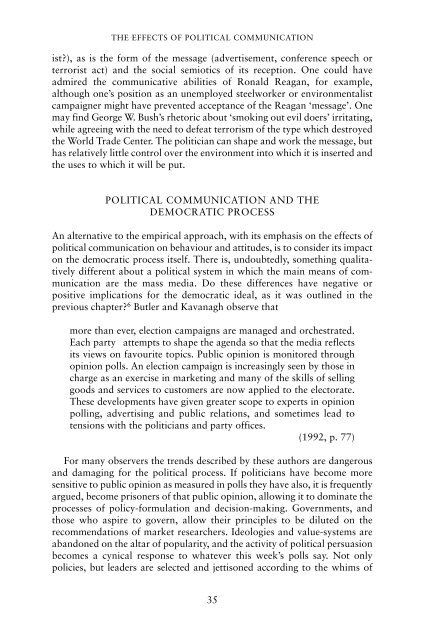20130412164339753295_book_an-introduction-to-political-communication
20130412164339753295_book_an-introduction-to-political-communication
20130412164339753295_book_an-introduction-to-political-communication
Create successful ePaper yourself
Turn your PDF publications into a flip-book with our unique Google optimized e-Paper software.
THE EFFECTS OF POLITICAL COMMUNICATION<br />
ist?), as is the form of the message (advertisement, conference speech or<br />
terrorist act) <strong>an</strong>d the social semiotics of its reception. One could have<br />
admired the communicative abilities of Ronald Reag<strong>an</strong>, for example,<br />
although one’s position as <strong>an</strong> unemployed steelworker or environmentalist<br />
campaigner might have prevented accept<strong>an</strong>ce of the Reag<strong>an</strong> ‘message’. One<br />
may find George W. Bush’s rhe<strong>to</strong>ric about ‘smoking out evil doers’ irritating,<br />
while agreeing with the need <strong>to</strong> defeat terrorism of the type which destroyed<br />
the World Trade Center. The politici<strong>an</strong> c<strong>an</strong> shape <strong>an</strong>d work the message, but<br />
has relatively little control over the environment in<strong>to</strong> which it is inserted <strong>an</strong>d<br />
the uses <strong>to</strong> which it will be put.<br />
POLITICAL COMMUNICATION AND THE<br />
DEMOCRATIC PROCESS<br />
An alternative <strong>to</strong> the empirical approach, with its emphasis on the effects of<br />
<strong>political</strong> <strong>communication</strong> on behaviour <strong>an</strong>d attitudes, is <strong>to</strong> consider its impact<br />
on the democratic process itself. There is, undoubtedly, something qualitatively<br />
different about a <strong>political</strong> system in which the main me<strong>an</strong>s of <strong>communication</strong><br />
are the mass media. Do these differences have negative or<br />
positive implications for the democratic ideal, as it was outlined in the<br />
previous chapter? 6 Butler <strong>an</strong>d Kav<strong>an</strong>agh observe that<br />
more th<strong>an</strong> ever, election campaigns are m<strong>an</strong>aged <strong>an</strong>d orchestrated.<br />
Each party attempts <strong>to</strong> shape the agenda so that the media reflects<br />
its views on favourite <strong>to</strong>pics. Public opinion is moni<strong>to</strong>red through<br />
opinion polls. An election campaign is increasingly seen by those in<br />
charge as <strong>an</strong> exercise in marketing <strong>an</strong>d m<strong>an</strong>y of the skills of selling<br />
goods <strong>an</strong>d services <strong>to</strong> cus<strong>to</strong>mers are now applied <strong>to</strong> the elec<strong>to</strong>rate.<br />
These developments have given greater scope <strong>to</strong> experts in opinion<br />
polling, advertising <strong>an</strong>d public relations, <strong>an</strong>d sometimes lead <strong>to</strong><br />
tensions with the politici<strong>an</strong>s <strong>an</strong>d party offices.<br />
(1992, p. 77)<br />
For m<strong>an</strong>y observers the trends described by these authors are d<strong>an</strong>gerous<br />
<strong>an</strong>d damaging for the <strong>political</strong> process. If politici<strong>an</strong>s have become more<br />
sensitive <strong>to</strong> public opinion as measured in polls they have also, it is frequently<br />
argued, become prisoners of that public opinion, allowing it <strong>to</strong> dominate the<br />
processes of policy-formulation <strong>an</strong>d decision-making. Governments, <strong>an</strong>d<br />
those who aspire <strong>to</strong> govern, allow their principles <strong>to</strong> be diluted on the<br />
recommendations of market researchers. Ideologies <strong>an</strong>d value-systems are<br />
ab<strong>an</strong>doned on the altar of popularity, <strong>an</strong>d the activity of <strong>political</strong> persuasion<br />
becomes a cynical response <strong>to</strong> whatever this week’s polls say. Not only<br />
policies, but leaders are selected <strong>an</strong>d jettisoned according <strong>to</strong> the whims of<br />
35
















